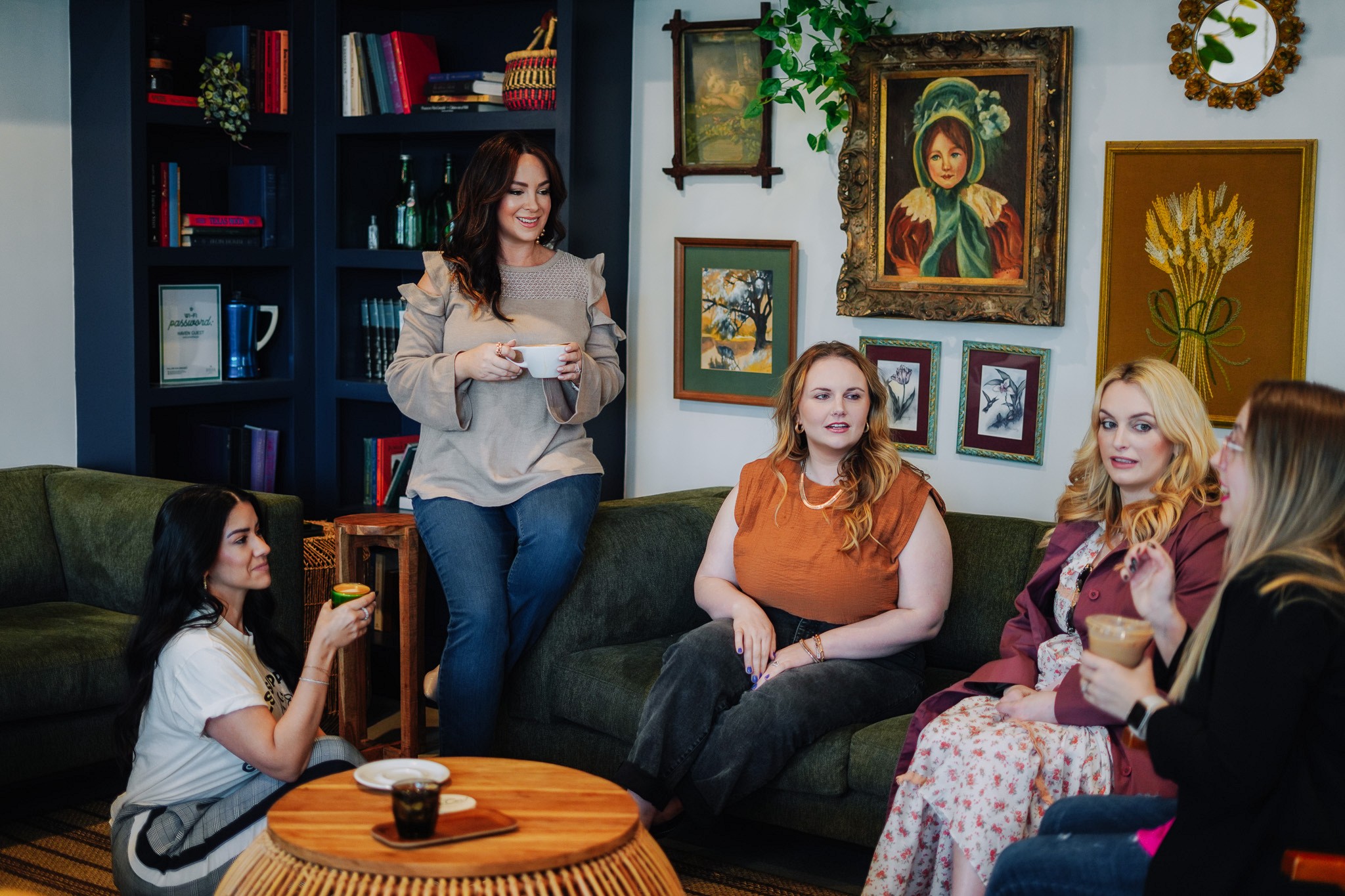Alright – so today we’ve got the honor of introducing you to Lexi St. Laurent Hartmann. We think you’ll enjoy our conversation, we’ve shared it below.
Lexi, so great to be with you and I think a lot of folks are going to benefit from hearing your story and lessons and wisdom. Impostor Syndrome is something we have words to describe, but it’s also something that has held people back forever, so we’re really interested to hear about your story, and how you overcame it.
Impostor Syndrome is something many of us navigate on a daily basis. Honestly, I don’t think we ever truly overcome it. However, we can learn to navigate it and push through the feelings of self-doubt that prevent us from stepping into our power and potential. I’ve had to be very intentional about this, and there are two things that have helped immensely in recent years.
First, it’s important to speak up. Too often, as women, we tend to stay quiet, whether it’s in meetings or significant conversations with friends or family. We are prone to peacekeeping. But when we practice speaking up boldly, we begin to see over time that our voices are powerful. More often than not, when I’ve been nervous about speaking up but chose to do it anyway, it was an incredibly validating experience.
Granted, no amount of external validation will ever “cure” impostor syndrome. That’s important to remember. It’s easy to fall into unhealthy patterns of seeking validation from others in the hopes that we’ll reach some critical mass of positive feedback that will instill in us the confidence we feel we’re lacking. That’s not going to happen.
But the validation we receive when we dare to speak up or show up—and even the inevitable criticism—can help us sharpen our instincts and trust ourselves more.
Another way I navigate impostor syndrome is by intentionally placing myself in the room with people who trigger those feelings of inadequacy in me. Usually, these are women who seem like they have it all figured out or who appear to be highly successful. What I’ve found is that when we get to know the people we feel intimidated by on a deeper level, we realize they, too, deal with the same feelings and doubts that we have. In some cases, they’ve even told me they were intimidated by me! Understanding that most of us deal with impostor syndrome on some level not only diminishes its power but also allows us to navigate it better together.
Thanks for sharing that. So, before we get any further into our conversation, can you tell our readers a bit about yourself and what you’re working on?
I’m Lexi St. Laurent Hartmann, and I’m the founder and CEO of iHartContent, a bilingual content agency dedicated crafting strategies that elevate purpose-driven creators and businesses to own their online presence and find their voice.
As a mom of two young girls and someone who has struggled with the negative mental health impacts of social media, I’m also committed to combatting the toxicity that often prevails online. I hope to educate and inspire others to shift their perspective on their own content in order to create a more inclusive, healthier online world.
I truly believe authentic, honest content can change the world. At my agency, we prioritize narratives that reflect real, relatable experiences because we believe that surrounding ourselves with reality—be it unretouched photos or vulnerable moments—helps us feel more comfortable with it.
Granted, it’s not always easy to be vulnerable, especially in a world that often rewards perfection. But I believe that proactively creating and consuming content rooted in reality is a powerful way to combat the feelings of inadequacy and disconnection that are so often exacerbated by a feed that shows only curated perfection. What’s more, it also fosters deeper, more meaningful connections between brands and their audiences. When we dare to be authentic, we create space for others to do the same.
Of course, this approach isn’t always easy. It requires a willingness to be vulnerable, to show up as our true selves even when it’s scary. But I firmly believe that it’s better for business in the long run. When we prioritize authenticity and connection over superficiality and perfection, we create a world where everyone feels seen, heard, and valued. And that’s a world I want to be a part of building.
Looking back, what do you think were the three qualities, skills, or areas of knowledge that were most impactful in your journey? What advice do you have for folks who are early in their journey in terms of how they can best develop or improve on these?
For me, flexibility, optimism, and more recently, a relentless commitment to authenticity have had the most profound impact on my journey. In a way, they each go hand-in-hand.
Being flexible and willing to pivot when needed has helped me weather some difficult storms in my career. Oftentimes, we hold on too tight to our initial vision for a product, business concept, or service, that we can’t clearly see what our audience is telling us they really want from us. If someone had told me two years ago that I would be known as an AI copywriting expert, I would have laughed and said, “absolutely not.” But stepping into the AI space early on has opened so many doors for me and led to so many great experiences and connections.
Similarly, I have learned to be optimistic and to proactively look for the open door when one closes. Challenging circumstances I faced as a child and young adult honed that particular skill. I learned early on to look for the silver lining in most things rather than dwelling on things I cannot change. It has served me well in my professional life. I tend to not see failure as failure, but rather as a sign that I need to move in a different direction.
My more recent commitment to authenticity stemmed from both of these, and it has had an enormous impact on my quality of life and the success of my business. In the fall of 2023, I was feeling very stuck and uninspired in my work, despite the fact that we were actually quite successful from a financial perspective. I began to entertain the idea of closing it down and going back to the corporate world. Instead, I tapped into my flexibility and optimism and gave myself the space to dive into an exploration of why I was feeling so stuck. What I discovered is that it was due to a lack of alignment with my values. I was not representing myself and my business in a way that I felt good about. In fact, I was actually contributing to the often toxic environment on social media by overusing filters and retouching photos. I made some significant changes, along with a promise to myself that authenticity would be my North Star from now on. The result is that I have never felt more free. I have made incredible connections with people who know and respect the real me, and I have started working with clients who are committed to the same level of authenticity in our work together.
Developing these skills requires a willingness to reflect honestly on your thoughts and actions. I would advise anyone early on in their journey to start with authenticity. When you are willing to be brutally honest with yourself about what you want and who you want in your corner, and then commit to seeking alignment with that vision in all things, the rest will fall into place.
Before we go, maybe you can tell us a bit about your parents and what you feel was the most impactful thing they did for you?
Growing up, I was passionate about riding horses, even though I lived in places where the winters were brutal. There would inevitably come a day every year when I’d consider quitting and taking up a more “indoorsy” sport. But my mom wouldn’t allow it. She’d tell me never to quit in the winter. If I really wanted to quit riding—this thing I had loved as long as I can remember—I had to do it in the spring when the weather warmed.
At the time, I thought she was just talking about riding. But as I’ve grown older, I’ve come to understand that her words apply to so much more than that. Whether you’ve ever sat on the back of a horse or not, the message is clear: there will always be challenges, always be times when success feels far out of reach, when it’s downright uncomfortable to take another step. But don’t quit in the winter. Get through this struggle, this hard day, and then—and only then—can you make the decision to quit, pivot, or carry on, and do it with clarity.
Of course there have been times when I’ve questioned whether her advice was right, whether there are some things that are better left behind. But more often than not, I’ve found that if I can just make it through the winter—whether that’s a literal season or a figurative one—I come out the other side stronger, more resilient, and with a clearer sense of what I want and where I’m going.
So to all the entrepreneurs, the dreamers, the goal-setters out there, I say this: don’t quit in the winter. Embrace the challenges, learn from the struggles, and trust that spring will come. And when it does, you’ll be ready to bloom.
Contact Info:
- Website: https://ihartcontent.com
- Instagram: https://instagram.com/ihartcontent
- Facebook: https://facebook.com/ihartcontent/
- Linkedin: https://www.linkedin.com/in/lexihartmann/
- Twitter: https://twitter.com/LexiMStL
- Youtube: https://www.youtube.com/channel/UCTbTw0lcobVDWB9HCIs3WxA




Image Credits
WorkPlay Branding




